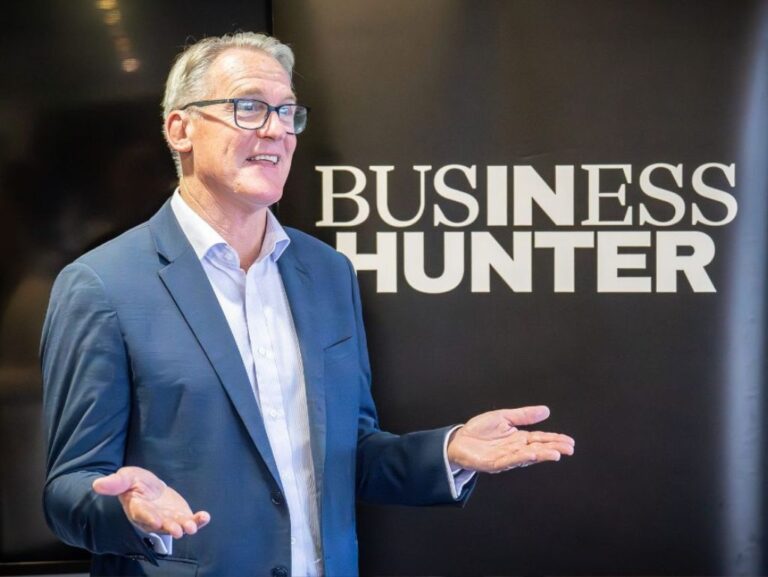Adam McDean has forged a path as a leader who inspires others to find business success.
He is the Managing Director of BusinessBasics, a business services firm, as well QMS Certification Services, a third-party international certification body.
Adam believes good leaders should set out to be transformational – setting seemingly unobtainable business goals and then undertaking to lead people to create and deliver on a plan to reach their objectives.

- How do you juggle two separate organisations and still implement effective leadership?
It’s a very difficult balancing act to be honest. While the two businesses have some crossover in clients and markets, they are very different in their structure and personnel requirements.
Fortunately we have some fantastic staff in key roles across both businesses and they are empowered and entrepreneurial enough to manage their roles without too much oversight.
That frees me up to, in effect, run and grow two businesses in the time it should take for one. We spend a lot of time on strategy and planning, where all employees are included in the process and we really try to reinforce how important everyone is to the team through those activities. Each of our businesses has its own unique requirements in terms of management and growth, and I put a lot of effort into getting my time management right. With the right planning, I can allocate enough time to each business and be effective in terms of day-to-day management and providing leadership for the teams.
- Throughout your career have you witnessed any leadership traits that struck you as particularly effective (or ineffective)?
I was privileged to work with some fantastic managers and leaders from a very young age, and they were responsible for encouraging me to step up to management and leadership positions while still very young. The most effective leadership traits I’ve seen throughout my career have been:
– Inclusion: Senior management proactively including ALL of the team in the management and decision-making processes – from the line managers to the admin staff. It is amazing how much positive feeling towards the company and its management flows from being included like that in important planning and decisions.
– Empowerment: When a leader puts a great deal of trust in you and steps out of the way, that is very empowering and great for your confidence. If they are willing to let you make small mistakes along the way, stepping in with help or praise when required, your skills are honed much faster than by following the traditional learning route.
- What tricks do you have to manage your priorities and your time?
I use “time batching” techniques and pre-planning as much as possible.
For example, every week in my calendar is pre-filled with blocks of time – at a high level each day is pre-booked in full for a specific purpose (this helps me stick to some semblance of a routine).
So Monday is booked for “Operations”, Tuesday is booked for “Finance”, Wednesday is “Sales & Marketing” and so on. I then use colour coding for those days (eg. Orange for Sales & Marketing) and use those colours to star emails in my inbox.
So if it’s Monday and you send me an email to do with Marketing, I will mark that with an orange star and not touch it until Wednesday (I do a quick scan first to ensure it’s not urgent). The idea is to batch all the similar emails and therefore activities (my life is literally run by my inbox). This “batching” of activities saves time by not needing to switch your thinking between completely different tasks and areas of the business. It is much easier to spend a whole day just completing sales and marketing tasks, then know you don’t have to touch that part of the business again for a week. This technique also goes a long way to alleviating my “zero inbox” thinking – once a message has been given a colour I know it’s ok to leave it alone until the scheduled day.
- What do you believe makes business in the Hunter unique?
I wouldn’t say that business in the Hunter is unique, as such, but there is certainly a predominance of very small businesses vs large corporations, compared to many other markets.
The Hunter is dominated by just a small handful of very large corporates and Government agencies and much of the economy is dependant on the supply chains the flow from those. One negative issue I see is many examples of Hunter businesses using suppliers or providers from Sydney without really looking for local alternatives first – I think many of us simply don’t know about many of the great businesses based in the Hunter and assume we need to look elsewhere.
- How do you define the difference between a Manager and a Leader?
A manager often needs to be very transactional in their role, while a leader needs to have more of the transformational traits.
Both are required in order to sustain and grow a good business and they do not necessarily need to crossover – that is, many good managers do not have or need good leadership qualities, and a good leader should be able to find good managers to perform the transactional work while they focus on leading the organisation.






